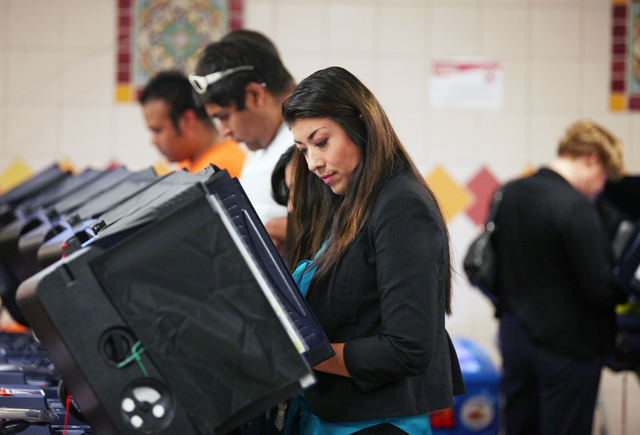Latino votes no longer a sure bet for Nevada Democrats

More than most Nevada candidates, Democrat Lucy Flores has counted on Hispanic voters to back her for lieutenant governor to boost her chances of beating Republican Mark Hutchison.
“This is how we win elections, by each and every one of you being active and coming out and voting,” Flores said Wednesday to more than a dozen Latinos gathered to cheer her on her way to cast her ballot in an early voting station at the Cardenas Market off east Bonanza Road.
“If you guys do that, we will win the election,” she added. “It’s as simple as that.”
But Nevada’s 268,000 Latino voters, who have played a decisive role in the past two Nevada elections — U. S. Sen. Harry Reid, D-Nev., has credited Hispanics for ensuring his difficult 2010 re-election — aren’t flooding the ballot box this year.
Democratic turnout is down across the board in early voting, while GOP enthusiasm is high. Nearly 20,000 more Republicans than Democrats had cast ballots as of Wednesday morning, giving the GOP a head-start on trying to sweep state offices, take over the state Senate and oust U.S. Rep. Steven Horsford, D-Nev.
Early voting ends Friday. The election is Tuesday.
Hispanics lean heavily toward the Democratic Party by voter registration, but many are unhappy about record-high deportations by the Obama administration and frustrated by long-stalled comprehensive immigration reform.
As a result, the Latino community has become less loyal to the Democratic Party since the 2012 election, according to a recent national poll by Latino Decisions.
Asked what’s driving them to vote this year, only 28 percent said support for the Democratic Party — a 10 percentage point drop from 2012, said David Damore, a University of Nevada, Las Vegas political science professor who works with Latino Decisions. Another 16 percent said they wanted to support the Republican Party.
Nearly half of the Hispanics polled, or 46 percent, said they would vote this year to “support the Latino community,” a sign of increasing independence from political parties, Damore said. Another 10 percent said they didn’t know.
“They’re disenchanted,” Damore said, adding that disenchantment doesn’t automatically lead to a GOP vote.
“They think the Republican Party has been outright hostile” to Latinos, he said Wednesday.
Instead, more Hispanics will sit out the Nov. 4 election, making it tougher for Democrats to win. In the 2010 election, Hispanics made up 15 percent of the electorate in Nevada and 17 percent to 18 percent in 2012.
Fernando Romero, president of Hispanics in Politics, shakes his head at the idea the Latino community might lose some of its electoral voice this year. His group’s ads in Spanish-language newspapers urge people to vote, although he said he understands why many Latinos are disgusted by politics these days.
“There are many promises that have not been kept,” he said. “Immigration is not the only issue, but it’s the main issue.”
Flores said she, too, feels frustrated. She said it was a mistake for President Barack Obama to delay action on immigration until after the election. Deportations are at a record 2 million under Obama.
“The president should have acted to the fullest extent of his authority,” Flores said.
Asked if Obama’s inaction has depressed Latino turnout, Flores hesitated and then said no. She said the real problem is that many working-class Hispanics are too busy with work and family to pay much attention to an election lacking high-profile races.
No presidential election nor U.S. Senate seat are at stake in Nevada this year. Republican Brian Sandoval, the state’s first Hispanic governor, is expected to win a landslide against little-known Democrat Bob Goodman.
Flores, one of the first Latinos to be elected to the Nevada Assembly in 2010, might not be enough of a draw for Hispanic Democrats, especially with polls showing her Sandoval-backed opponent headed for victory.
Flores noted that unlike in presidential election years, little money has been spent on Hispanic community outreach.
“Some people don’t even know there is an election,” Flores declared.
But even if Hispanic turnout were high, Flores hasn’t consolidated Latino support. Hispanics in Politics, for example, endorsed her opponent.
Romero attributed that endorsement to low participation by Democratic members.
He also notes that Nevada’s Latino community is becoming more diverse, with a growing South and Central American population who identify more with the GOP than do those with roots in Mexico and Puerto Rico.
“I know Democrats expect Hispanics to vote for them, but you have to work for it,” Romero said. “It’s not automatic.”
Inside Cardenas Market, Flores cast her ballot at one of the 16 stations between a fresh juice bar and a Wells Fargo bank. About half of the voting booths were occupied.
The market is in the heart of the 1st Congressional District, where registered Democrats outnumber Republicans by 2-to-1.
U.S. Rep. Dina Titus, D-Nev., who represents the district, joined Flores at her Latino event. Titus’ Republican opponent is Annette Teijeiro, a Hispanic who draws Latino support, but Titus is expected to cruise to re-election, given her district’s Democratic tilt.
Titus said Democrats just need to convince Hispanics that not voting will help the Republicans and hurt the cause for immigration reform.
“A vote for the Republicans is a vote against immigration because they have refused to bring it up for a vote time and time again,” Titus said.
Contact Laura Myers at lmyers@reviewjournal.com or 702-387-2919. Find her on Twitter: @lmyerslvrj.